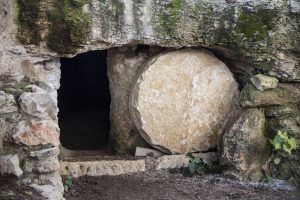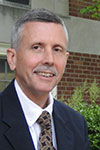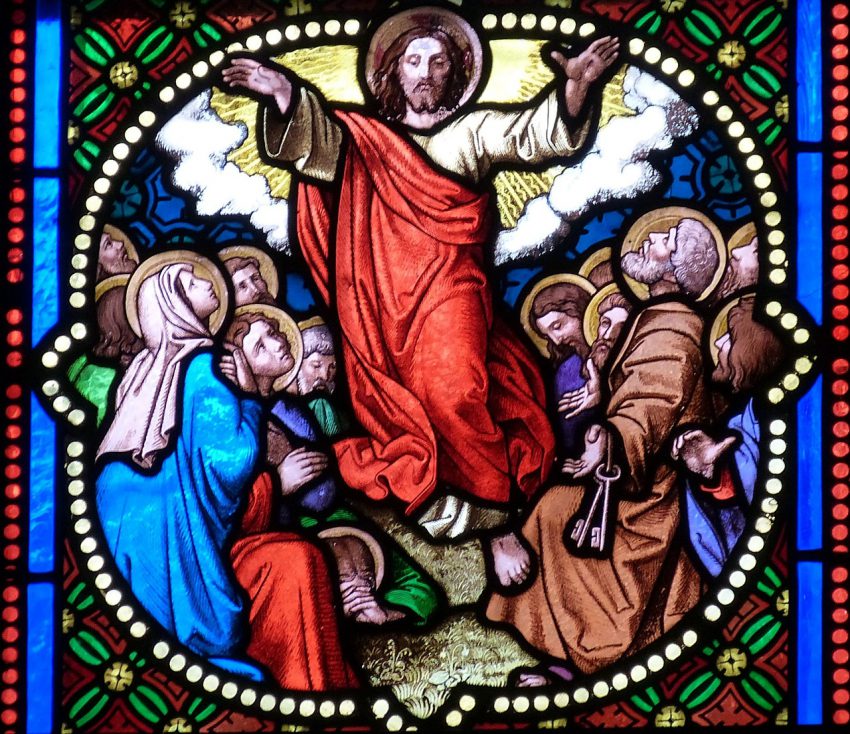Last Thursday marked Ascension Day in the liturgical calendar, an ecumenical observance falling on either the 40th day after Easter or the following Sunday (depending on tradition and ecclesial province). Though acknowledged by many traditions—as a Principal Feast in the Anglican Communion and as a Solemnity in the Roman Catholic Church, for example—the commemoration of Jesus’ ascension is often overshadowed by its neighboring liturgical holidays: Easter and Pentecost. In this post, James Henry Snowden Professor of Systematic Theology the Rev. Dr. John P. Burgess reflects on John 6:60-66, a passage which brings together Jesus’ death, ascension, and the Lord’s Supper.
– Sarah Betzig, Communications Strategist at Pittsburgh Theological Seminary
Fleeting Glimpses
“Then what if you were to see the Son of man ascending to the place where he was before?” (John 6:62)
It’s not unusual for people to dream about someone who has passed away. My father died many years ago, but my brother recently dreamt about him: Dad walked into the kitchen, sat down, ate a bowl of Cheerios, and left again, without saying a word.
Jesus’ resurrection appearances have a dreamlike quality about them. Sometimes, his disciples don’t recognize him—not at first—but sometimes they do. He passes through closed doors and shows them his wounds. Or he calls to them from the seashore, after they have gone fishing. It’s the same Jesus, but something is different about him. He comes back, but he never stays.
Ascension Day is odd. Forty days after Easter, 10 days before Pentecost. One of those in-between holy days that we don’t quite know what to do with. Do we celebrate it with loud, clashing cymbals because Jesus has now taken his seat at the right hand of God the Father Almighty? Or does Ascension Day ask us to wait quietly for the outpouring of the Holy Spirit?

Even the biblical witness is mixed. When Jesus meets Mary in the garden on Easter morning, she is amazed. Jesus tells her not to hold him, because he has not yet ascended to the Father. In contrast, in Luke’s Gospel, Jesus blesses the apostles as he departs, and they return to Jerusalem with great joy. But Acts tells the story yet differently again. The disciples stand gazing into heaven as a cloud takes him out of sight, and they are neither amazed nor joyful, but perplexed.
Why does Jesus appear only to disappear again? Why does a loved one appear in your dream only to leave again?
As a college student, my mother and I got into the habit of writing each other every week. So often, my mother’s letters would mention an elderly relative or one of her friends who had passed away. That was hard for me to relate to; I was still just beginning my life journey. But now that I’m older, I understand. So many losses. Friends, family members, mentors. Now they’re gone. Our faith tells us to rejoice for them, but how we miss them. How we long for them. Whenever they come back to me in a dream—which to my dismay rarely happens—I want to hold on, and I wonder why they have to leave again.
 In this Gospel passage, the disciples murmur because Jesus has told them, “Unless you eat the flesh of the Son of man and drink his blood, you have no life in you.” So, he challenges them further (paraphrasing): “Well, if that offended you, what about this: What if you were to see the Son of man ascending to the place where he was before?” The Gospel tells us that many drew back and no longer went with him.
In this Gospel passage, the disciples murmur because Jesus has told them, “Unless you eat the flesh of the Son of man and drink his blood, you have no life in you.” So, he challenges them further (paraphrasing): “Well, if that offended you, what about this: What if you were to see the Son of man ascending to the place where he was before?” The Gospel tells us that many drew back and no longer went with him.
Why doesn’t Jesus stay? Why does he have to leave? The one we want to hear and see, touch and embrace, is gone. He has entered into a different dimension of reality.
Sometimes, we sense that other dimension of reality, so different from our everyday thinking and working and resting. We saw the incredible eclipse last month or the glorious sunrise the next morning, and we sensed another dimension filled with wonder. And there are moments, perhaps at a funeral, where your heart feels so heavy, but time seems to stop, and you have that odd sensation of what the Puritans called “solemn joy.” Sometimes, we’re so desperate to experience that other dimension that we do things to manipulate our consciousness, hoping, just hoping, to touch it.
But whatever that other dimension of reality is about, it eludes us. We simply do not have the power to pull back the curtain. Jesus comes from beyond, and he returns without us. All we can do is stand, like the disciples, and gaze into heaven, waiting for him to come again.
![]()
Pulling Back the Curtain: Meeting the Risen Lord at the Table
Paul tells us that whenever we celebrate the Lord’s Supper, we declare the Lord’s death until he comes. Jesus is not here; he now belongs to that other dimension, whatever it is. The One who rose in a body is gone. We do not see him, hear him, or touch him. And, yet, as he told his disciples, “Unless you eat the flesh of the Son of man and drink his blood, you have no life in you.” Or, to turn the negative into a positive, “If you eat the flesh of the Son of man and drink his blood, you do have life in you.” He is here in this bread and this cup. He is really with us, here and now, in the flesh—and, yet, as in a dream. Within our everyday dimension of life, yet beyond it. Present, yet absent.
We so wish that we could hold on to him. Why does he have to leave? Why won’t he stay? There is no answer except this: whenever we come to this table, he promises that he will lift us up. He will lift up our hearts, and we will ascend into heaven, where the risen Lord sits at the right hand of God the Father Almighty. For a moment, the curtain is pulled back, we see the risen Lord, and we enter into that other dimension and have life—life to share with others, life for the world.

The Rev. Dr. John P. Burgess is the James Henry Snowden Professor of Systematic Theology at Pittsburgh Theological Seminary. He is an ordained Minister of Word and Sacrament in the Presbyterian Church (U.S.A.) and has served as a member of the Presbyteries’ Cooperative Committee on Examinations and the Re-forming Ministry Initiative (Office of Theology and Worship) and as a faculty mentor for the Company of New Pastors, as well as serving many congregations part time. Dr. Burgess was a Fulbright Scholar to Russia in 2011 and in 2018-2019, a Luce Fellow in Theology for 2011-2012, and a research fellow at the Center of Theological Inquiry in 2014-2015. He has authored numerous books and currently conducts research on the Russian Orthodox Church in post-communist Russia.
Read Next



